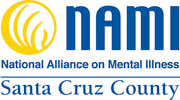In Our Own VoiceIn Our Own Voice (IOOV) is a unique public education program developed by NAMI, in which trained speakers share compelling personal stories about living with mental illness and achieving recovery.
IOOV is an opportunity for those who have struggled with mental illness to gain confidence and to share their individual experiences of recovery and transformation. Throughout the IOOV presentation, audience members are encouraged to offer feedback and ask questions. Audience participation is an important aspect of IOOV because the more audience members become involved, the closer they come to understanding what it is like to live with a mental illness and stay in recovery. |
|
IOOV presentations are given to consumer groups, students, law enforcement officials, educators, providers, faith community members, politicians, professionals, inmates, and interested civic groups.
All presentations are offered free of charge.The goals of IOOV are to meet the need for consumer- run initiatives, to set a standard for quality education about mental illness from those who have been there, to offer genuine work opportunities, to encourage self-confidence and self-esteem in presenters, and to focus on recovery and the message of hope.
Anyone familiar with mental illness knows that recovery is not a singular event, but a multi-dimensional, multi-linear journey characterized more by the mindset of the one taking it than by his or her condition at any given moment along the way.
Understanding recovery as having several dimensions makes its uneven course easier to accept. Recovery is the point in someone's illness in which the illness is no longer the first and foremost part of his or her life, no longer the essence of all his or her existence.
Ultimately, recovery is possible.
All presentations are offered free of charge.The goals of IOOV are to meet the need for consumer- run initiatives, to set a standard for quality education about mental illness from those who have been there, to offer genuine work opportunities, to encourage self-confidence and self-esteem in presenters, and to focus on recovery and the message of hope.
Anyone familiar with mental illness knows that recovery is not a singular event, but a multi-dimensional, multi-linear journey characterized more by the mindset of the one taking it than by his or her condition at any given moment along the way.
Understanding recovery as having several dimensions makes its uneven course easier to accept. Recovery is the point in someone's illness in which the illness is no longer the first and foremost part of his or her life, no longer the essence of all his or her existence.
Ultimately, recovery is possible.

